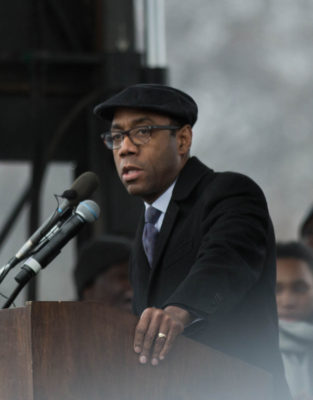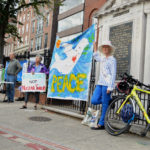
American civil rights activist Cornell William Brooks will be joining Boston University’s faculty this semester as a visiting professor with a joint appointment between the School of Law and the School of Theology.
Brooks, a 1987 STH alumnus who served as president of the National Association for the Advancement of Colored People, said he looks forward to using his background in law and social justice activism to educate the BU community.
“I want to not only just teach but also learn from the students of [LAW] and [STH] who have questions like ‘what can we do now’ and ‘what we are all collectively as a republic,’” he said in reference to national political developments.
Before his days as a BU theology student, Brooks served as an ordained minister. He then earned his Master of Divinity degree with a concentration in social ethics and systematic theology from STH and went on to get a law degree from Yale Law School.
With his tenure at the NAACP behind him, Brooks will return to his alma mater thirty years later as a visiting professor of social ethics, law and justice movements.
After news of Brooks’ NAACP exit broke, many campus officials sought to bring him to BU, STH Dean Mary Elizabeth Moore said.
“There was a momentum to bring him in because we thought he would be a very important and challenging conversation partner and leader in our community during this year,” Moore said.
Brooks will be teaching a joint course between LAW and STH this fall semester titled, “Violence, the Vote, and Hope: An Examination of Ethics, Law and Justice Movements.”
Although STH has had joint appointments with other schools in the past, Moore said this is its first time partnering with LAW.
Moore added that she hopes students will gain inspiration from Brooks and see the potential for work in social justice after taking his class.
The class isn’t only about current political movements, but it will also cover the actions individuals have historically taken in the face of injustice, according to Brooks, noting that today’s rocky political climate “didn’t start when the [current] president was inaugurated.”
Several students said they are excited to have such a well-recognized name in the world of social activism at BU.
Meaghan Richardson, a sophomore in the College of Engineering, said the joint class will provide a unique perspective.
“A joint class that sees things from the perspective of both a theologian and an attorney is very important and could prove to be very beneficial to the future practices of the current law students,” she said.
Jean Paul Vazquez, a junior in the College of Arts and Sciences, said he thinks the class is a timely offering.
“This class is really important in the current political environment,” Aponte said. “People think religion and law are separate, but they really aren’t.”
Jenny Chang, a sophomore in the College of General Studies, said a professor who is an expert in multiple fields like Brooks will be a useful addition at BU.
“Nowadays, religion has become a part of everything,” she said. “Having a professor who knows both about theology and law is great for our community.”



